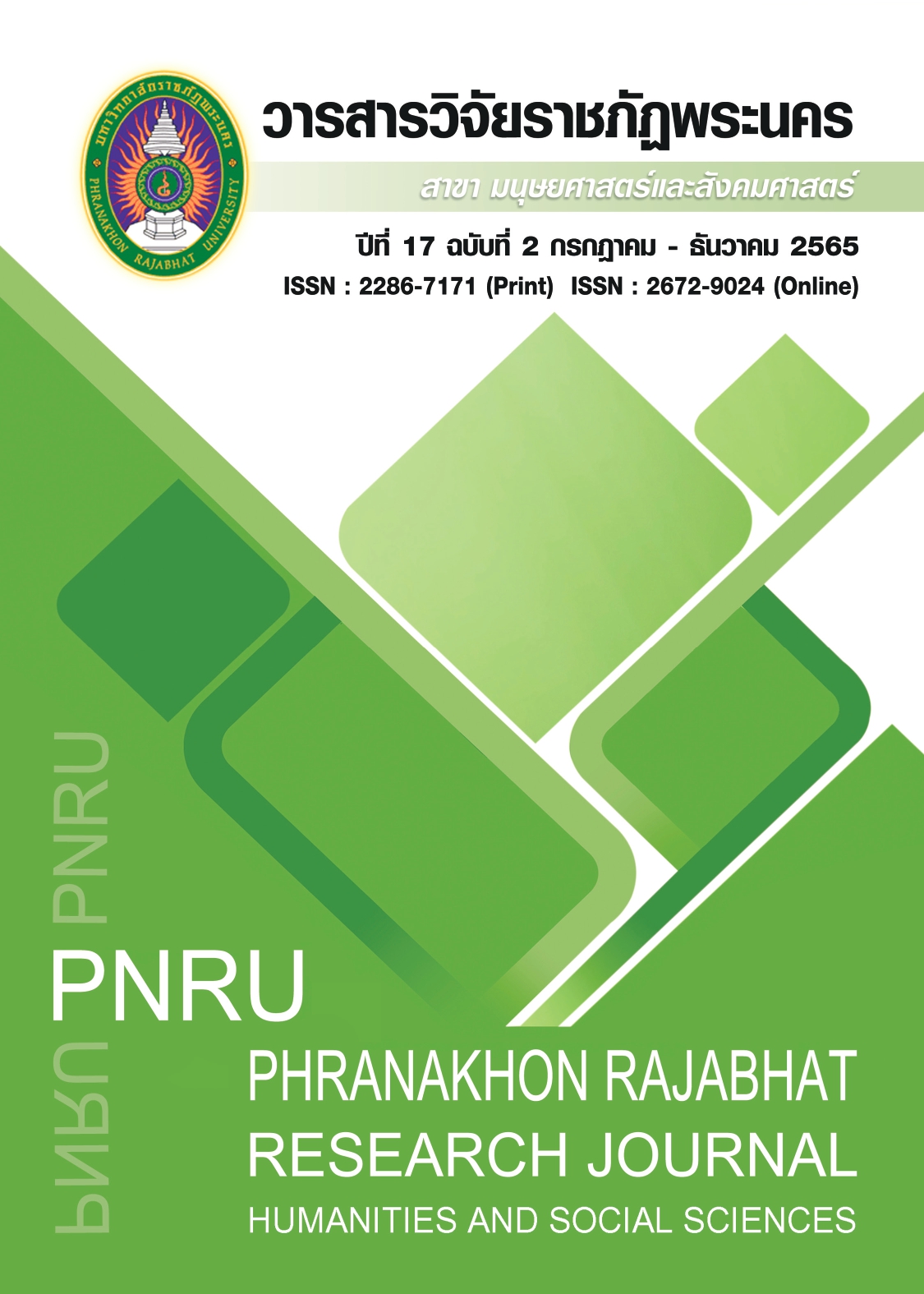LEADERSHIP, ORGANIZATIONAL SUPPORT AND POLICE OFFICER PERFORMANCE IN SUBUNIT OF STATIONS OF METROPOLITAN POLICE DIVISION
Main Article Content
Abstract
The purposes of this research were to study: 1) the level of effect of leadership on organizational support and police officer performance; and 2) the level of effect of organizational support on police officer performance in the subunits of stations of the Metropolitan Police Division. A quantitative method was applied in this research. The types of research design are: hypothesis testing, correlational study, minimal interference, unit of analysis is subunit, cross-sectional descriptive study, and applied structural equation modeling analysis.
The results indicated that 1) leadership had a statistically significant positive direct effect on organizational support and police officer performance; and 2) organizational support had a statistically significant positive direct effect on police officer performance. The results showed that the metropolitan police division should enhance and develop leadership, organizational support, and police officer performance.
Article Details

This work is licensed under a Creative Commons Attribution-NonCommercial-NoDerivatives 4.0 International License.
Each publish articles were copyright by Phranakorn Rajabhat University
Any contents which appeared in each articles in the journal were authors personal opinion. It did not relate to Phranakorn Rajabhat University and other instructors in the university. Each authors would take responsibility on their articles. If there are any mistake, the authors will take responsibility themselves
References
Chandasuwan, P. (2011). Leadership, organizational culture and organizational effectiveness of the schools managed by Bangkok Metropolitan Administration: structural equation modeling. (Doctoral dissertation). National Institute of Development Administration, Bangkok, Thailand.
Chandasuwan, P. (2018). Handout: Qualtitative research methodology. Bangkok: National Institute of Development Administration.
Avolio, B. J. (1999). Full leadership development: Building the vital forces in organization. Thousand Oaks, CA: Sage.
Bass, B. M. (1990). Bass and Stogdill’s handbook of leadership: Theory, research, and managerial application (3rd ed.). New York, NY: Free Press.
Bass, B. M. (1998). Transformational leadership: Industrial, military, and educational impact. Mahwah, NJ: Lawrence Erlbaum.
Bass, B. M., & Avolio, B. J. (1995). Transformational leadership development: Manual
for the multifactor leadership questionnaire. Palo Alto, CA: Consulting Psychologists Press.
Beach, D. S. (1970). Personal: The management of people at work. New York, NY: MacMillan.
Borman, W. C., & Motowidlo, S. J. (1993). Expanding the criterion domain to include elements of contextual performance. In N. Schmitt, & W. C. Borman (Eds.), Personnel Selection in Organizations. San Francisco, CA: Jossey Bass.
Bovee, C. L. (1993). Management. New York, NY: McGraw-Hill.
Buila, I., Martínez, E., & Matute, J. (2019). Transformational leadership and employee performance: The role of identification, engagement and proactive personality. International Journal of Hospitality Management, 77(1), 64-75.
Campbell, J. P. (1990). Modeling the performance prediction problem in industrial and organizational psychology. In M. D. Dunnette & L. M. Hough (Eds.), Handbook of industrial and organizational psychology (pp. 687–732). Consulting Psychologists Press.
Gouldner, A. W. (1960). The norm of reciprocity: A preliminary statement. American Sociological Review, 25(2), 161–178.
Koopmans, L., Bernaards, C. M., Hildebrandt, V. H., Schaufeli, W. B., De Vet, H. C. W., & Van Der Beek, A. J. (2011). Conceptual frameworks of individual work performance: A systematic review. Journal of Occupational and Environmental Medicine, 56(8), 856–866.
Lee, K. H. (2010). Effects of ethical leadership on perceived organizational support and organizational commitment of nurses in a hospital: Mediating role of perceived organizational support. Journal of Korean Academy of Nursing Administration, 16(4), 419-427.
Liden, R. C., Wayne, S. J., Zhao, H., & Henderson, D. (2008). Servant leadership: Development of a multidimensional measure and multi-level assessment. The Leadership Quarterly, 19(2), 161–177.
Meyer, J., & Allen, N. (1997). Commitment in the workplace: Theory, research, and application. Thousand Oaks, CA: Sage.
Miao, R., & Kim, H. (2010). Perceived organizational support, job satisfaction and employee performance: An Chinese empirical study. Journal of Service Science and Management, 3(1), 257-264.
Mohamed, S. A., & Ali, M. (2015). The influence of perceived organizational support on employees’ job performance. International Journal of Scientific and Research Publications, 5(4), 1-6.
Motowidlo, S. J. (2003). Job performance. In W. C. Borman, D. R. Ilgen, & R. J. Klimoski (Eds.), Handbook of psychology: Industrial and organizational psychology, 12 (pp. 39-53). New York, NY: John Wiley & Sons.
Muhtasom, A., Mus, H. A. R., Bijang, J., & Latief, B. (2017). Influence of servant leadership,
organizational citizenship bahaviour on organizational culture and employee performance at Star hotel in Makassar. International Journal of Education and Research, 5(10), 71-88.
Narcıkara, E. B., & Zehir, C. (2016). Effect of organizational support in the relationship between spiritual leadership and performance. International Journal of Humanities and Social Science, 6(12), 29-42.
Northouse, P. G. (2000). Leadership: Theory and practice. Thousand Oaks, CA: Sage.
Northouse, P. G. (2010). Leadership: Theory and practice (5th ed.). Thousand Oaks, CA: Sage.
Nuruddin, A., & Sridadi, A. R. (2019). Investigate the mechanism between empowering leadership and perceived organizational support for employee performance by using self-efficacy as mediation and knowledge sharing as a moderator. Jurnal Maksipreneur, 9(1), 85–102.
Pradeep, D. D., & Prabhu, N. R. V. (2011). The relationship between effective leadership and employee performance. International Conference on Advancements in Information Technology, 20(1), 198-207.
Rhoades, L., & Eisenberger, R. (2002). Perceived organizational support: A review of the literature. Journal of Applied Psychology, 87(4), 698–714.
Robbins, S. P. (2005). Organizational behavior (11th ed.). Upper Saddle River, NJ: Pearson.
Stogdill, R. (1974). Handbook of leadership: A survey of theory and research. New York, NY: The Free Press.
Tomigolung, H. N. (2015). The effects of servant leadership on employee performance at regional government office southeast Minahasa. Jurnal EMBA, 3(1), 163-172.
Wahyu, N. D. (2019). The effect of perceive organizational support and transformational leadership style on employee performance of Surabaya municipality's education service office. Russian Journal of Agricultural and Socio-Economic Sciences, 8(92), 33-41.
White, D. D. (1991). Organization behavior. New York, NY: Dryden Press.
Williams, L. J., & Anderson, S. E. (1991). Job satisfaction and organizational commitment as predictors of organizational citizenship and in-role behaviors. Journal of Management, 17(3), 601–617.


